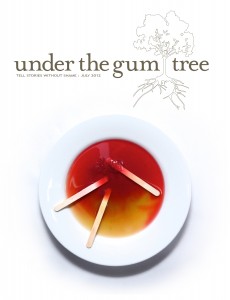 The best part of reading submissions is when I come across a story and instinctively say to myself, “I know exactly what this writer is talking about—I have so been there.”
The best part of reading submissions is when I come across a story and instinctively say to myself, “I know exactly what this writer is talking about—I have so been there.”
That happened more than once with the stories in this issue, and that can only mean one thing: We are all doing our job. You are doing your job of telling and sharing your story, and my editors and I are doing our job of discovering them, giving them life and sending them off to find readers.
Whether telling stories of infertility or sex addiction, mourning death or living with mental disorders, the embarrassment that sometimes comes with a new crush or reconciling your own identity with the one your parents had in mind, the contributors in this issue have all done their job.
Sometimes doing my job is not easy. One thing I have found that helps me do my job better is practicing yoga. It may sound silly, but yoga is time for me to be quiet, reflect on how I’m doing, pray. It’s definitely a spiritual experience: to understand how utterly amazing my body is, what it’s capable of. I lift my hands and heart to the sky and recognize the divine power that gives me the strength I need to do my job. My job of publishing this magazine. My job of telling stories. My job of loving the people in my life. It’s calming and centering. It gives me perspective.
By taking time to disconnect from the computer, from the phone, I remember what is important, and the most important thing is that we help each other live the best life possible. I do that by telling stories. Sometimes those stories are about things like depression, and people worry about me when they read them. But those stories get the most response, so I know that telling them is part of my job.
Saying that we are doing our job may not sound very glamorous. But it’s accurate and true. Consider what Steven Pressfield says in his monumental book, The War of Art:
“The amateur plays for fun. The professional plays for keeps.
To the amateur, the game is his avocation. To the pro, it’s his vocation.
The amateur plays part-time. The professional is there seven days a week.
The word amateur comes from the Latin root meaning ‘to love.’ The conventional interpretation is that the amateur pursues his calling out of love, while the pro does it for money. Not the way I see it. In my view, the amateur does not love the game enough. If he did, he would not pursue it as a sideline, distinct from his ‘real’ vocation.
The professional loves it so much he dedicates his life to it. He commits full-time.”
This is what I mean when I say that publishing this magazine and telling stories is my job. It’s so essential that I can’t not do it. Telling our stories is the most powerful way we create human connection and it’s our job—our duty—to share our story with each other.
Maybe you’re not ready to share your own story, but you can share this magazine with someone who might need to read the stories in it. You’d still be doing your job of helping to share and spread stories.
Here’s to telling stories without shame,
Janna Marlies Maron
Editor & Publisher
Note: this is my editor’s letter from Issue 4 of Under the Gum Tree. Read my other editor’s letters here.
